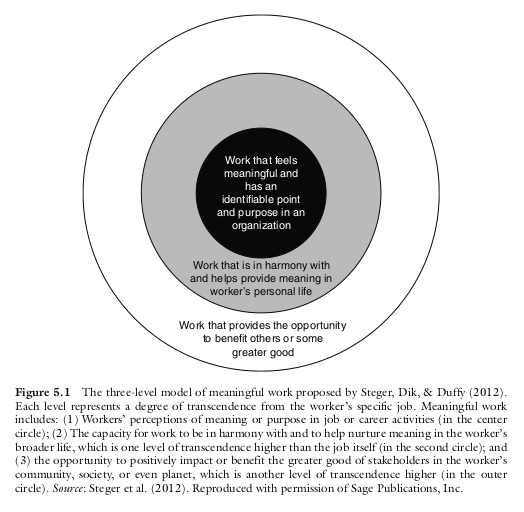Meaningful Work as Self‐Transcendence
Wednesday, May 03, 2017 3:18:00 PM
Theories of meaningful work could in some ways be said to draw their inspiration from Durkheim’s (1897) sociological analysis of suicide. Durkheim argued that one cause of suicide was unemployment because it deprived people of their function and their opportunity to contribute to society. That a noted sociologist was so concerned with the damage unemployment could do to people may have been rooted in the massive changes wrought by the Industrial Revolution to the role of work in people’s lives. In some ways, work was transformed from a predestined path trod by all members of a particular family lineage, where Shoemakers made shoes, Cartiers transported goods, and Breuers made beer. As machines replaced human labor and as assembly line techniques deconstructed work into a sequence of connected tasks, traditional occupations were uprooted and people became responsible not for production as fait accompli but rather for production in terms of incremental additions to a whole. More than 100 years after Durkheim’s observations about the dire impact of losing one’s place in society through the loss of work, we still see concerns about how quickly the world of work changes, how rapidly “human” jobs are outsourced or even replaced by robots or algorithms. As technology continues to change the shape of work in our lives, by increasing competition in the job market, increasing globalization, and increasing the reach of workplace communications into personal time, people struggle with the challenge of trying to balance work demands with life priorities. […]
Steger and colleagues drew upon the much larger body of scholarship on meaning in life as a whole to identify the important role of self‐transcendence in meaningful work (for review, see Steger, 2009, 2012a, 2012b). It has been theorized and shown that as people transcend their own immediate and self‐centered concerns to embrace the concerns of those beyond themselves they experience greater meaning in their lives (e.g., Dik, Duffy, & Steger, 2012; Reker, Peacock, & Wong, 1987; Schnell, 2009; Steger, Kashdan, & Oishi, 2008). The model Steger and colleagues developed can be displayed in terms of concentric circles indicating people’s degree of transcendence from the basic qualities of a job. Meaningful work transcends simple job execution when workers perceive that their work is meaningful and has a point or purpose within the organization. The relationship of one’s work to meaning in one’s personal life as a whole is another step of transcendence away from simple job characteristics. Finally, the ability of work to surpass benefits to one’s own life and provide broader impacts for the greater good represents yet another level of transcendence. Figure 5.1 displays the dimensions of meaningful work from this theory. In the central circle is the extent to which a worker judges her or his job to be meaningful and significant. In the next circle is the degree to which a job or work is harmonious with meaning and purpose in the worker’s life as a whole, or alternatively, helps workers build more meaning in their lives. In the largest circle is the degree to which a job or work helps the worker contribute to or positively impact others or the greater good in prosocial ways.
The Wiley Blackwell Handbook of the Psychology of Positivity and Strengths-Based Approaches at Work; Lindsay G. Oades, Michael Steger, Antonelle Delle Fave, Jonathan Passmore; January 2017, https://www.amazon.com/Psychology-Positivity-Strengths-Based-Wiley-Blackwell-Organizational/dp/1118977653/
